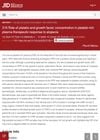 January 2024 in “Vestnik oftalʹmologii”
January 2024 in “Vestnik oftalʹmologii” Stopping minoxidil and using prostaglandin analogues improved the man's eye condition.
[object Object]  January 2023 in “Voprosy kurortologii fizioterapii i lechebnoĭ fizicheskoĭ kultury”
January 2023 in “Voprosy kurortologii fizioterapii i lechebnoĭ fizicheskoĭ kultury” COVID-19 may cause hair loss, often after recovery, with androgenetic alopecia being the most common type.
3 citations,
January 2022 in “Journal of The American Academy of Dermatology” 1 mg/day of low-dose oral minoxidil is effective and safe for treating female hair loss.
 December 2022 in “BMC women's health”
December 2022 in “BMC women's health” The CNC® prosthetic system improved body image in breast cancer patients with hair loss from chemotherapy but did not significantly change their psychological wellbeing.
 July 2022 in “Journal of Investigative Dermatology”
July 2022 in “Journal of Investigative Dermatology” High platelet numbers in PRP may not be essential for hair growth, and certain growth factors could negatively affect treatment outcomes for hair loss.
PRP therapy at Ethos Spa improves hair growth and quality with minimal maintenance.
May 2013 in “International journal of innovative research and development” The document concludes that understanding hair's chemical makeup is key to creating effective hair growth products that also improve social confidence.
November 2022 in “Medical science” Herbal treatments are safe and effective for androgenic alopecia when used with other therapies.
January 2018 in “72° Congresso di Anatomia e Istologia”  51 citations,
April 2021 in “JAMA network open”
51 citations,
April 2021 in “JAMA network open” The AI tool helped primary care doctors and nurse practitioners diagnose skin conditions more accurately.
37 citations,
May 2018 in “Transgender health” Oral estradiol works for many transgender women but needs personalized dosing and monitoring.
 9 citations,
January 2017 in “International Journal of Trichology”
9 citations,
January 2017 in “International Journal of Trichology” The study suggests that mast cells might be involved in the hair loss condition telogen effluvium and could be a target for treatment.
4 citations,
May 2014 in “Pharmaceutical Biology” Glycyrrhizic acid from sweet licorice can effectively remove hair without skin irritation.
 3 citations,
March 2022 in “Polymers”
3 citations,
March 2022 in “Polymers” Substances from Ascidian tunics might help treat hair loss as effectively as Minoxidil.
 3 citations,
August 2021 in “Clinical, Cosmetic and Investigational Dermatology”
3 citations,
August 2021 in “Clinical, Cosmetic and Investigational Dermatology” Teledermatology was popular among young adults and women, and high-resolution photos improved service during the pandemic.
 2 citations,
July 2023 in “Journal of dermatology”
2 citations,
July 2023 in “Journal of dermatology” Alopecia areata causes a significant economic burden in Japan, mainly due to productivity loss.
2 citations,
January 2021 in “Springer eBooks” PRP is useful for hair restoration, facial rejuvenation, and wound healing.
 2 citations,
January 2014 in “Journal of clinical and investigative dermatology”
2 citations,
January 2014 in “Journal of clinical and investigative dermatology” Some drugs used to treat immune conditions may cause different types of hair loss.
 1 citations,
February 2022 in “PLOS ONE”
1 citations,
February 2022 in “PLOS ONE” Hair loss is more common in male Chinese college freshmen, and it's linked with rosacea but doesn't affect their quality of life.
Instagram ads for skin, hair, and nail supplements often make broad health claims without clear ingredient information, and are not FDA-regulated.
1 citations,
August 2021 in “International Journal of General Medicine” Severe and early hair loss may indicate a higher risk of heart disease.
1 citations,
May 2013 in “Implant dentistry” Haircuts and medical growth factors do not cause cancer.
 June 2024 in “ESMO Gastrointestinal Oncology”
June 2024 in “ESMO Gastrointestinal Oncology” The combination treatment showed a higher response rate but no significant survival benefits.
 April 2024 in “Clinical, cosmetic and investigational dermatology”
April 2024 in “Clinical, cosmetic and investigational dermatology” Saudi dermatologists' understanding and use of low-dose oral Minoxidil for hair loss may not be fully represented due to a small survey sample and language barriers.
 March 2024 in “Clinical, Cosmetic and Investigational Dermatology”
March 2024 in “Clinical, Cosmetic and Investigational Dermatology” Saudi dermatologists know about low-dose oral minoxidil for hair loss but don't often prescribe it, partly due to its unavailability.
 September 2023 in “Journal of the American Academy of Dermatology”
September 2023 in “Journal of the American Academy of Dermatology” Dermatologists can accurately detect smaller differences in hair density than previously thought.
[object Object] 
Canadian lawsuits involving 5-alpha-reductase inhibitors are related to persistent erectile dysfunction side effects, with no judgments against companies yet.
April 2023 in “Journal of Investigative Dermatology” The MDhair app accurately assesses hair loss severity with 94% accuracy.
Androgenetic alopecia is more common in male Chinese adolescents and linked to rosacea, but doesn't affect quality of life.
















